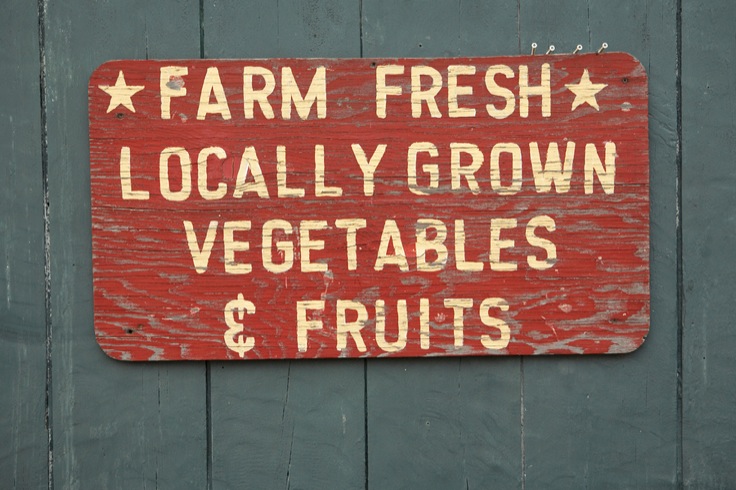
Many of us love the idea of homesteading… but are unable to do it yet. I’m here to tell you, just because you do not grow and raise most of your own food right now, this does not limit you to the grocery store as your only source of food.
Ironically, although there are grocery stores galore, the conventional grocery store is often the hardest (and most expensive) place to find well-raised or well-grown, quality natural foods. Fortunately, there are numerous alternatives!
And they are…
Farmers and Homesteaders
Turn to local farmers and homesteaders in your area. Farmers often sell their products locally, and homesteaders may sell their products depending on the scale of farming they do. It’s definitely worth inquiring. This is a particularly efficient way to source meat and dairy, especially since if you purchase in bulk — a side of beef or a dozen chickens — the price will be discounted.
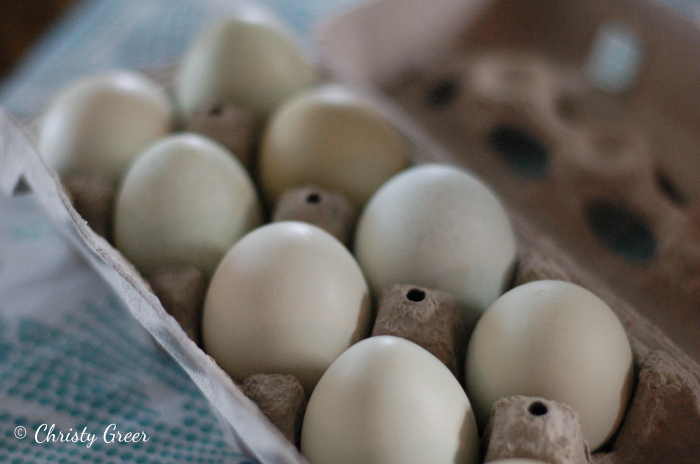
If you source food directly from a local farm, there is no beating your confidence in the product you are receiving. You know where it came from, where it was processed and how it was raised. Additionally, you are supporting local foods, small farmers and businesses, and often ecologically-minded growing practices which benefit the animal, land, and consumer.
Websites like Eat Local Grown and Local Harvest are designed to connect you with local farmers and producers in your area. You can also begin your search by asking friends and co-workers, or visiting a farmer’s market to ask the sellers there.
Farmers’ Markets
Speaking of farmers’ markets, many areas, even urban downtowns, typically have a farmers’ market or two (or more). Check newspapers, the internet, town centers, and local farms — just ask around for locations. Farmers’ markets are particularly great sources for fresh produce because often the produce is picked that morning and brought straight to market.
Talk with the farmers at the market and ask questions about their growing practices. Just because their products aren’t labeled “organic” doesn’t mean they aren’t grown carefully. Many farmers farm in sustainable, ecologically-minded ways but have never gone through the organic certification process (which can be expensive and difficult for small farmers). Talking with farmers is also a great means of networking. They may be able to source other products for you, even if they are not currently sold at the market.
CSA
CSA stands for Community Sustained Agriculture. CSAs are run in various ways, but typically the buyers pay a fee for the upcoming growing season at the end of the previous season. This money helps the farmer prepare for the upcoming year, and the number of shares sold helps the farmer determine demand. As the farmer grows produce, the buyers each receive a box of produce every week, which is their share of the harvest.
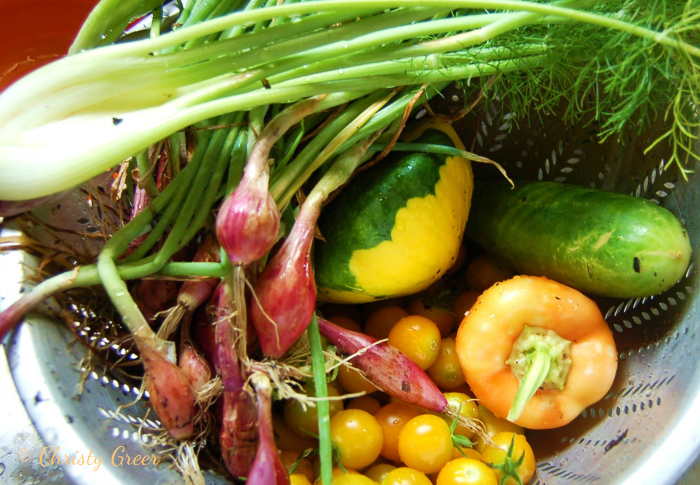
CSAs are a fabulous way to get super fresh, locally grown, in-season produce. Depending on where you live, your season may be shorter or longer, but you’re likely to receive produce for at least half the year, if not more. Some CSAs also include other local products like milk, eggs, cheese, and honey.
Sometimes a CSA requires a certain amount of farm service, either as a part of purchasing a share, or in exchange for a discounted share. This is a wonderful opportunity for children to get hands-on practice farming and learn where their food comes from. (If you have an eye toward homesteading in the future, this is also a great learning opportunity for you!)
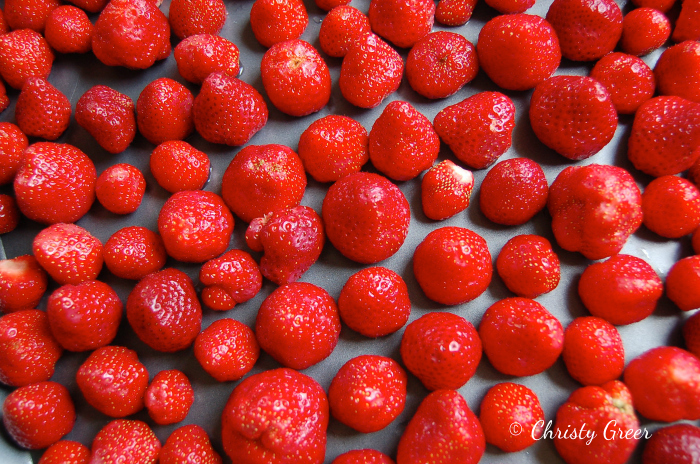
Pick Your Own
If you live in the suburbs or in an agricultural area, there are likely to be u-pick farms nearby. Get to know the owners and ask about their growing practices. Frequent the farm throughout the growing season and pick all you can. Dehydrate, can, ferment or freeze extra produce for the rest of the year. Don’t forget to ask about seconds — the farmer sells imperfect produce and you get a great deal. Nothing is wasted. It’s a win-win situation!
Gardening
Even if you can’t all-out homestead, you can always grow something. Lettuce and herbs will grow in a sunny window or even under a grow light. Keep in mind you can likely grow more than you think you can, as I wrote last month. If you have any homesteading desires or plans, gardening in some capacity right now should be on your “must-do” list. Now is the time to learn on a small scale before you venture forth on a large scale.
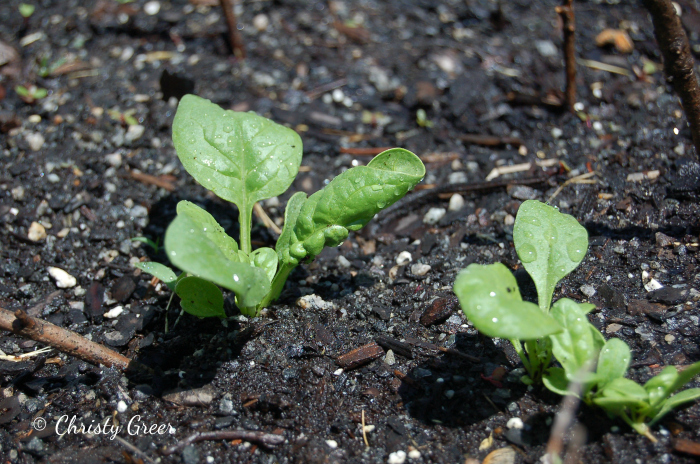
Co-ops
Co-ops are run in many different fashions, but typically co-ops provide you with the ability to purchase in bulk a wide variety of products at low prices. I currently belong to two co-ops. One is run from a farm on a small scale. The other is run on a large scale across a region of states. Both co-ops provide me with quality food at excellent prices.
Local Produce Delivery
Produce delivery can be a worthwhile option for busy people, especially busy people in suburban areas or big cities. A local produce delivery service networks with local farmers and delivers a box of fresh, locally-grown produce to your doorstep each week. Typically a delivery service is not your most cost-effective option, but it is an easy way to purchase local foods and support the local farmers in your area. (There are also local milk delivery services in some areas.)
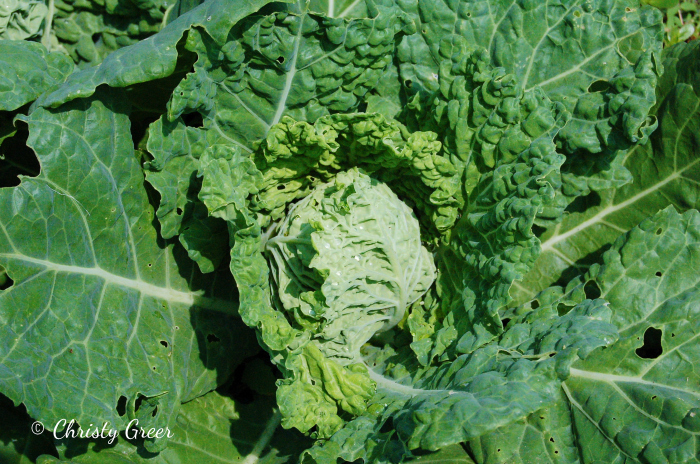
The Internet
While the internet wouldn’t be my top go-to source for food, it can be a useful and cost-effective means of obtaining some foods, particularly foods that are not local to your area like coconut oil. Vitacost sells coconut oil and raw organic honey. Because of their “free shipping over $49” deal, I make large purchases periodically throughout the year. While I do grow some of my own herbs, Mountain Rose Herbs is my go-to source for herbs and essential oils. And occasionally I find good deals on overstocked meats at Organic Prairie.
Warehouse Stores
Many natural and real food eaters wonder if it is worthwhile to join a large warehouse store such as Costco. I think it is because, like the internet, a warehouse store can provide you with food that may not be local to your area, often for good prices. Some of the items my mom and I buy at our local Costco are coconut oil, organic olive oil, USA-grown nuts, wild-caught salmon (fresh, frozen, or smoked), frozen organic USA-grown vegetables, and sometimes fresh organic produce. Throughout the year other items pop up here and there, as well.
Go Shopping!
I hope this post has inspired you, brought you some new ideas or got you thinking out of the box. As I mentioned before, websites like Eat Local Grown and Local Harvest are useful in helping you find most of these alternative shopping choices. There is quality food to be had — sometimes we just need to do a bit of searching to find it.
Where do you do your alternative grocery shopping?
We only recommend products and services we wholeheartedly endorse. This post may contain special links through which we earn a small commission if you make a purchase (though your price is the same).


I use Azure Standard for a lot of my staples and things we don’t grow ourselves. Our group also has connections with local meat providers who will sell their wares on the drop day. My husband and I have several acres, and we have chickens (we’re planning on getting more). We’re hoping to sell some of our excess locally. Our community has a FB group page for that purpose and it is pretty active.
We use Azure Standard for the things we just can’t get around here.
I get my staples from http://www.iherb.com. I get organic coconut milk from Amazon. I get my milk, yogurt and eggs from a local farmer. I get grassfed meat from US Wellness online. I get Amish cheese from a co-op in PA. I rarely go to the supermarket.
I buy from Azure as well. I have not found local sources for grass fed and finished meat or local dairy products 🙁 i do make trips out to the farms during growing/harvesting season. I am at the mercy of the local stores during off season though. Some say that some items are organic but i dont trust the FDA’s definition of organic!
For the last year that we’ve been in transition I think I’ve used all these resources! We order from Azure the things I can grow or make. I recently discovered all kinds of great organics at Costco, and I’ve taken advantage of all the farmers markets that I can.
Do you think the “organic” products sold at Costo are truly organic? There is such widespread deception with the term.
Ginny, I think you’re wise to be considering this. “Organic” is just a label and not always entirely what you think it is/should be. I’ve researched certain brands (some have better track records than others), and I also always check country of origin. I think it was Kitchen Stewardship who wrote a helpful piece on the organic label. If interested in reading it, search her archives for it. Your question is one reason I prefer to find as many products locally as possible, where it is easy to talk to growers/producers and learn about growth, production and practices. But that’s not possible for every product most of us want to buy…thus we go to places like CostCo.
I wouldn’t be too quick to write off all of Costco’s (or anyone’s) organic selection without digging for info on it. Whole New Mom researched the Carrington Farm’s organic coconut oil being sold at CostCo, which is quite inexpensive. She learned it was actually a very good product and wrote an informative post on that. Several years ago a lot of organic olive oils were independently tested for adulteration (of other oils) and CostCo’s Kirkland Organic brand came out as one of the purest olive oils. Based on that I wouldn’t say ALL of CostCo’s organics are high quality. You may want to research specific products you want to buy. But generally speaking, an organically labeled product is likely to be of better quality than a conventional product when buying at a standard grocery store/warehouse. It may not be top quality or as “organic” as one would assume, but it’s likely to be better than the alternatives. You can also look for other organic labels on products like Oregon Tilth, which I believe that certification is more strenuous than the USDA Organic label.
I read blog after blog touting the benefits of buying from these “alternative sources” but you know what? The grocery store is CHEAPER! I can get a 5# bag or organic apples for $5.50 at the grocery store on sale during apple season. To go pick my own from a local conventionally grown farm? almost $8
Same with meat-$1.99 per pound at Trader Joes for a whole organic chicken, $25 for a similar chicken from a farm.
$3.59 for a dozen organic eggs at the grocery store….$5 at the farmers market
$4 a pound for organic ground beef at costco…$7 a pound IN BULK from a ranch
$7 a gallon of organic milk at WF….$14 a gallon pasturized(!!!) milk from a dairy
Where on earth do you guys get the idea that shopping like this is cheaper???
And don’t even get me started on CSA’s…We go through 2-3 times the amount they provide for the same price at costco/WF/Safeway and all organic! 2 adults, 3 kids under 5 yrs including all toiletries, trash bags etc (we don’t use diapers or papertowels)-I’m lucky to get below $1000 per month
I can hear your frustration coming through. It must be frustrating to hear one thing and experience the opposite. I’m sorry my post was unhelpful.
If you are finding costs to be cheaper for you at the grocery store and that is working for you, then go for it! I know depending on where you live in the US, certain things can be more of a challenge to source than others. For instance, I live on the east coast and it’s easy for me to source grass-fed beef inexpensively from local farmers. My sister lives on the west coast and beef costs more for her there. Most ranchers live quite far from her. On the other hand, she can source organic produce far cheaper than I can. I’m not trying to convince you that my way of shopping “is right.” I’m just trying to share alternative sources for food in hopes that others may learn what is truly available to them and hopefully find some better and cheaper ways to source their own food. Every idea won’t work for everyone, but maybe some will.
I don’t want to argue with you about costs because obviously we are encountering different costs, but I’d like to share with you a few examples that might help explain where I’m coming from and why I wrote what I did. My husband and I have 4 kids and I spend $550 a month on groceries, and we live in a very expensive county. I’ve been able to keep the spending low because I source most of my food from places other than the grocery store. It took me a lot of searching to find quality sources that weren’t overly expensive. But just to give you a few examples from my situation: I can buy eggs from a local farm where the chickens are truly outdoors and supplemented with non-GMO, soy-free feed for $.25-75 less than the grocery store cost for organic cage free eggs. The best price I can find for organic beef is ground beef for $4.00/lb at the store. I buy 1/4 cow each year from a farmer (grass-fed which is better quality than organic) and get not only ground beef but steaks and roasts, plus bones, organ meats and tallow for $4.00/lb. I buy organic wheat for $.79 a pound in bulk from a co-op and grind my own flour (vs. paying $1.00/lb for organic whole wheat flour at the store). In the summer we pick as much fresh fruit as we can at our local IPM farm (not quite organic but they do a great job using alternative pest control and caring for their soil) and we freeze it, which makes it cheaper than buying frozen fruit. Our farm offers discounts for picking more than 10 or 20 lbs (depending on the fruit), so if we pick a lot and use it year round (by freezing) we save more. Those are just a few examples that I hope help to explain to you where I’m coming from.
If you live in NW Oregon, Tri county farms is a good site. It covers many farms (produce as well as meat/eggs) in Clackamas, Multnomah and Washington counties. Generally good quality products and quality service. Prices are reasonable. http://www.tricountyfarm.org/
There is also the Pumpkin Patch on Sauvies Island in Portland, Oregon.
You are so right about costs varying in different parts of the country. I live in a rural Northern AZ town, and I can choose from 3 grocery stores and a Wal-Mart (within 35 miles). Whenever I travel yo my parent’s house (5 hrs south), I stock up on certain items at Costco. Obviously, these trips aren’t feasible to make on a whim, so if I run out of a Costco item, I pay more for it up North. We are a family of 7 with 1 in diapers, and it is a task…with careful planning.. to stay inside of an $800 budget. And I don’t always buy organic meat, either, although I am trying to re-work the budget to fix that. Thank you for your post. 🙂
I use spud.ca and they arrange the csa for many of the farms around our area. They provide wonderful service. And you can base your selections on your values and have it delivered to your door weekly.